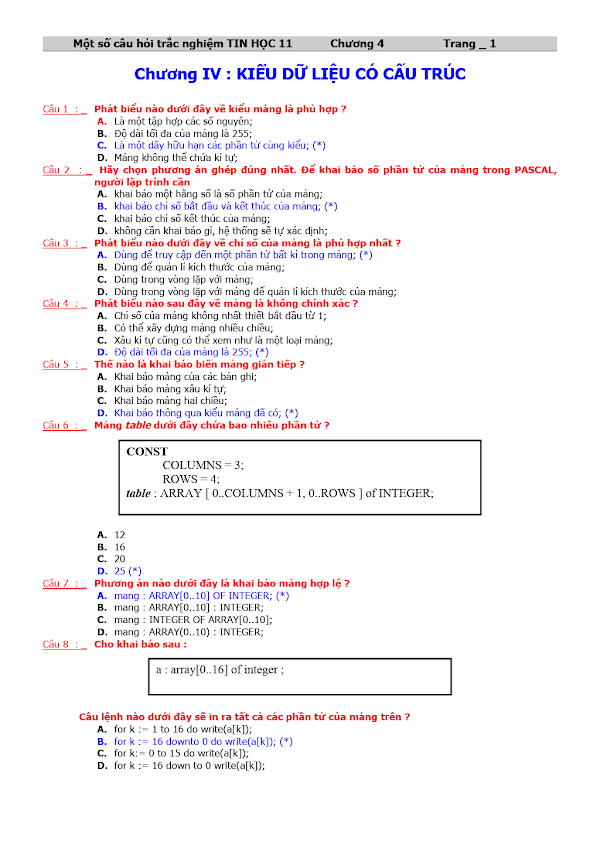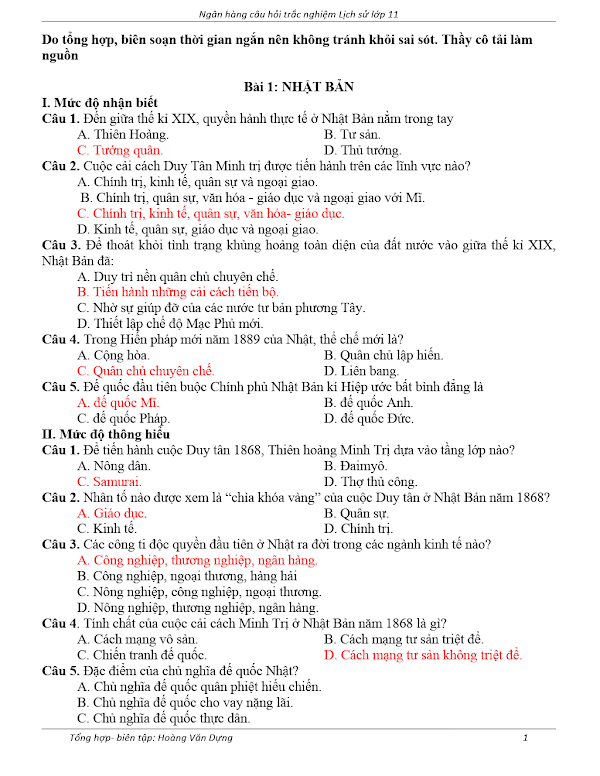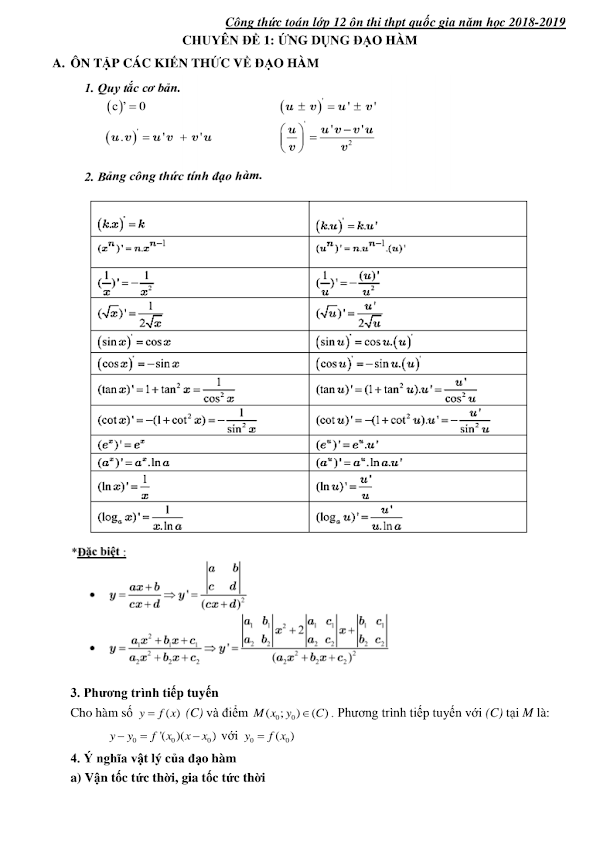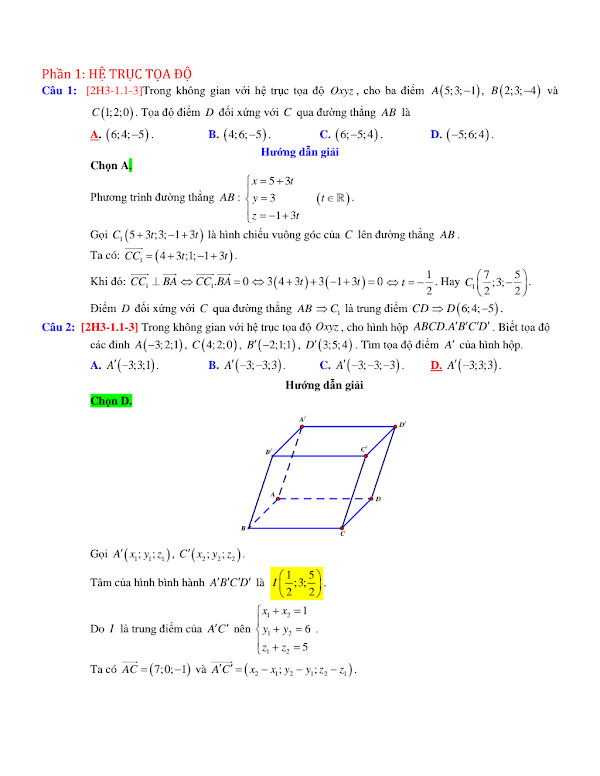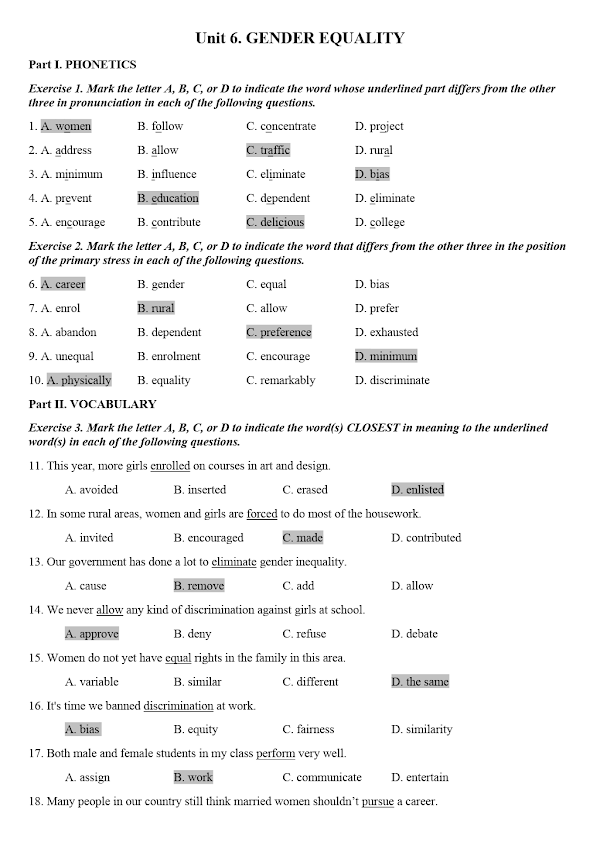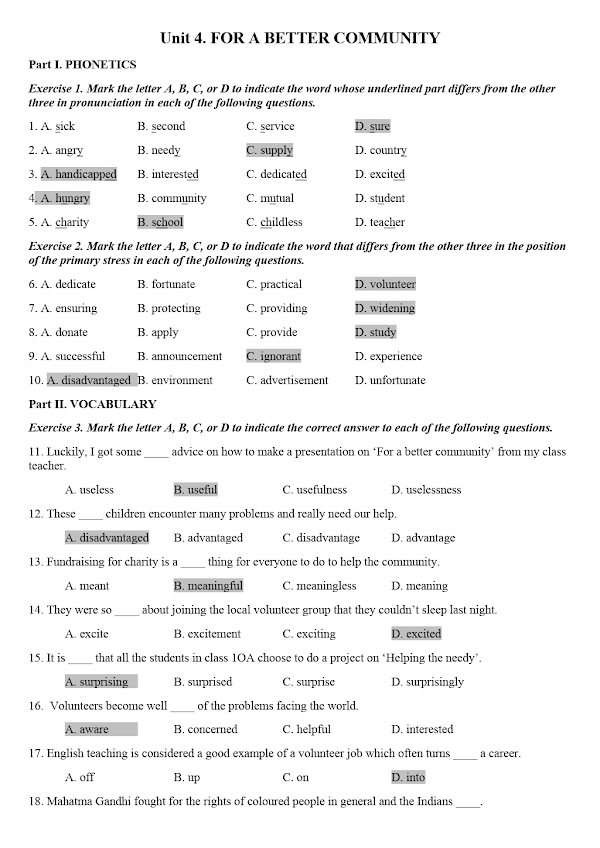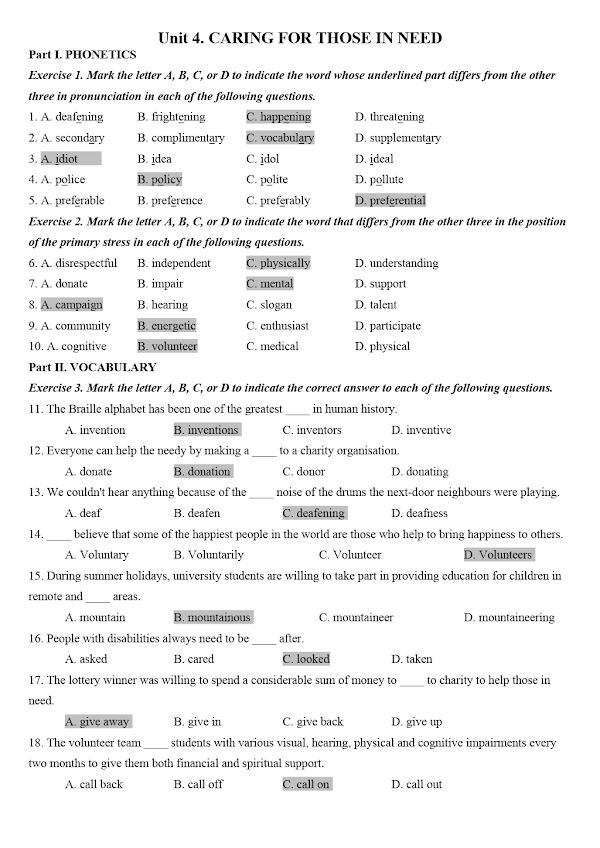Đề luyện tập kiểm tra môn Tiếng Anh lớp 12 - unit 5: Cultural identity
Chào các bạn học sinh và quý thầy cô, hôm nay LogaVN gửi tới bạn đọc tài liệu "Đề luyện tập kiểm tra môn Tiếng Anh lớp 12 - unit 5: Cultural identity". Hi vọng sẽ giúp ích cho các bạn học tập và giảng dạy.
Unit 5. CULTURAL IDENTITY
Part I. PHONETICS
Exercise 1. Mark the letter A, B, C or D to indicate the word whose underlined part differs from the other three in pronunciation in each of the following questions.
01. A. international B. nation C. national D. nationality
02. A. language B. massage C. marriage D. shortage
03. A. because B. nurse C. horse D. purpose
04. A. cultures B. customs C. ideas D. migrants
05. A. passed B. realized C. touched D. wished
Exercise 2. Mark the letter A, B, C or D to indicate the word that differs from the other three in the position of the primary stress in each of the following questions.
06. A. anthem B. appear C. attire D. attend
07. A. unify B. unique C. uniqueness D. unite
08. A. assimilate B. diagnose C. festival D. scenery
09. A. diversity B. endanger C. geography D. opposite
10. A. circumstance B. considerate C. community D. identity
Part II. VOCABULARY
Exercise 3. Mark the letter A, B, C or D to indicate the word(s) CLOSEST in meaning to the underlined word(s) in each of the following questions.
11. When it comes to diversity, language can be a bridge for building relationships, or a tool for creating and maintaining divisions across differences.
A. assimilation B. distinction C . uniformity D. variance
12. The situation got out of hand when the festival organisers couldn't foresee that the mob would get angry because they were stopped from taking the offerings.
A. hard to complete B. difficult to control C. impossible to find D. unlikely to happen
NEW CURRICULUM TEXTBOOK-BASED PRACTICE TEST UNIT 5: CULTURAL IDENTITY
Đỗ Bình – THPT Liễn Sơn, Lập Thạch, Vĩnh Phúc – HYPERLINK "http://www.violet.vn/quocbinh72" www.violet.vn/quocbinh72 Trang PAGE \* MERGEFORMAT 1
Unit 5. CULTURAL IDENTITY
Part I. PHONETICS
Exercise 1. Mark the letter A, B, C or D to indicate the word whose underlined part differs from the other three in pronunciation in each of the following questions.
01. A. international B. nation C. national D. nationality
02. A. language B. massage C. marriage D. shortage
03. A. because B. nurse C. horse D. purpose
04. A. cultures B. customs C. ideas D. migrants
05. A. passed B. realized C. touched D. wished
Exercise 2. Mark the letter A, B, C or D to indicate the word that differs from the other three in the position of the primary stress in each of the following questions.
06. A. anthem B. appear C. attire D. attend
07. A. unify B. unique C. uniqueness D. unite
08. A. assimilate B. diagnose C. festival D. scenery
09. A. diversity B. endanger C. geography D. opposite
10. A. circumstance B. considerate C. community D. identity
Part II. VOCABULARY
Exercise 3. Mark the letter A, B, C or D to indicate the word(s) CLOSEST in meaning to the underlined word(s) in each of the following questions.
11. When it comes to diversity, language can be a bridge for building relationships, or a tool for creating and maintaining divisions across differences.
A. assimilation B. distinction C . uniformity D. variance
12. The situation got out of hand when the festival organisers couldn't foresee that the mob would get angry because they were stopped from taking the offerings.
A. hard to complete B. difficult to control C. impossible to find D. unlikely to happen
13. A number of practices at local festivals have come under strong scrutiny in recent years.
A. approval B. attention C. disapproval D. examination
14. Local people believe that the festival is an opportunity to teach younger generations about patriotism and bravery. A. heroism B.justice C. loyalty D. truth
15. A smiling Princess Anne was attired in an aqua-blue hat and matching jacket, with white top.
A. caught B. grabbed C. revealed D. shown
16. This is especially important in the age of globalisation, where countries face a daunting challenge to preserve their own cultural identities.
A. intimidating B. delighting C. encouraging D. urging
17. The Indigenous experience, like with any form of belonging, is highly fluid and context-specific, meaning there are countless examples of what such cultural pluralities can look like.
A. countable B. uncountable C. too few to count D. too many be counted
18. Steve Kootenay-Jobin, Aboriginal housing coordinator at Mount Royal University, notes that many Indigenous students who move to the city for education, encounter culture shock.
A. avoid B. confront C. overcome D. wipe out
19. Culture has been described as features that are shared and bind people together into a community.
A. divide B. engage C. force D. unite
20. Once you have been accepted as a pupil or student at the school or college, it's against the law for them to discriminate against you because of your religion or belief.
A. judge B. neglect C. misinterpret D. expel
21. Changes in attitudes, family values, generational status can occur in both the majority and minority cultures as the two interact; however, typically one culture dominates.
A. normally B. rarely C. specially D. uncommonly
22. Integration and assimilation can help reduce feelings of loss and grief as the migrant starts to incorporate aspects of the majority culture.
A. disadvantage B. disapproval C. discrimination D. sadness
Exercise 4. Mark the letter A, B, C or D to indicate the word(s) OPPOSITE in meaning to the underlined word(s) in each of the following questions.
23. They fear that with the enactment event taken off, the festival may fade away in obscurity.
A. darkness B. dimness C. fuzziness D. sharpness
24. Launched by the federations and foundations, Group's brands find local expression through the promotion of social solidarity and culture.
A. division B. identity C. teamwork D. unity
25. Many ethnic groups find it hard to maintain their own languages.
A. continue B. discontinue C. preserve D. speak
26. The 21st century has witnessed the surprisingly increasing formation of multicultural societies where a varying number of ethnic people stay together.
A. continental B. global C. universal D. worldwide
27. The custom of worshiping ancestors is a beautiful, rich, and colorful and joyful tradition in Vietnamese culture.
A. blaming B. praying C. honoring D. respecting
28. He said he was only joking, but his comments were so close to the bone.
A. annoying B. offensive C. personal D. respectful
29. Hispanics are expected to abandon their heritage to live in the US.
A. adopt B. discard C. drop out D. withdraw
30. For this reason, many immigrants flock to this country in search for new beginnings and better lives.
A. crowd B. gather C. group D. spread
31. Nothing valuable could come of a revival of the German martial spirit, better to leave it behind or bury it. A. awakening B. destruction C. improvement D. population
32. Kootenay-Jobin says the cultural integration experience can be exacerbated by challenges such as racism and housing.
A. increased B. improved C. provoked D. worsen
33. Cultural changes in identity can be stressful and result in problems with self-esteem and mental health. A. anxiety B. confidence C. dissatisfaction D. modesty
34. Post-migration stresses include culture shock and conflict, both of which may lead to a sense of cultural confusion, feelings of alienation and isolation, and depression.
A. disconnection B. loneliness C. sympathy D. unfriendliness
Exercise 5. Mark the letter A, B, C or D to indicate the underlined part that needs correction in each of the following questions.
35. On a flip side, the world wide adoption of a couple of languages that have a large number of speakers has led to the death of several less popular languages. A B C D
36. For conclusion, the death of local languages is an alarming development.
A B C D
37. Over fifty thousand English words have been deriving from the Greek language.
A B C D
38. It is important to understand the culture religion of the country that you are travelling to and a little research before you leave will help tremendous. A B C D
39. Linguists aware that a language becoming extinct does not necessarily mean that the people who spoke it have all died. A B C D
40. It is our duty to critically examine the elements, which we must preserve, which will be maintained as our specific cultural identities, which we can be proud. A B C D
41. Even today, Breton as well as several other minority language in France, and the rest of the world, are not legally protected. A B C D
42. Besides visiting ancient monuments and tombs, coming to Hue, you can also have a chance to bathe and lying under the sun on the most wildly beautiful beaches in Viet Nam. A B C D
43. Sometimes people learn the outsiders' language in addition to their own; this has happened in Greenland, when Kalaallisut is learned alongside Danish. A B C D
44. By some estimates, 80 per cents of the world's languages may vanish within the next centuries.
A B C D
45. Many signed languages, including American Sign Language, have born within the last few centuries.
A B C D
46. Minority communities, for instance, Aboriginal peoples, over 80% whose native languages will die with the current generation, account for most of the world's languages. A B C D
47. According to linguists, children can learn several languages well, as good as they know when to speak each one. A B C D
48. According to me, I think if one is from the country with strong and old traditions, it will be rather difficult for him to adapt to the new customs and moreover to reject his own. A B C D
49. Individuals define themselves by nationality, ethnic, language, clothing and food.
A B C D
50. In forest worshiping, people worship the gods of trees and villagers sacrificed their lives to protect the village. A B C D
Part III. GRAMMAR
Exercise 6. Mark the letter A, B, C or D to indicate the correct answer to each of the following questions.
51. How long_________ Gerry?
A. has you been knowing B. has you know C. have you been knowing D. have you known
52. How many times_________ New York?
A. has Charles been visiting B. has Charles visited
C. have Charles been visiting D. have Charles visited
53. She_________ French words for hours, but she still doesn't remember all of them.
A. has been learning B. has been learnt C. has learnt D. have been learning
54. My father_________.
A. has never smoked B. have never smoked
C. has never been smoking D. have never been smoking
55. Oh dear, the light_________ all night.
A. has been burning B. has burnt C. has burned D. have burning
56. We_________ Lisa recently.
A. hasn't seen B. haven't seen C. haven't been seeing D. haven't been seen
57. I_________ fifteen phone calls this morning.
A. has been making B. have been making C. have been made D. have made
58. _________ anything so strange in your life?
A. Have you ever been hearing B. Have ever you been hearing
C. Have you ever heard D. Have you ever heared
59. You're red in the face. _________
A. Has you ran? B. Have you been runned?
C. Have you ran? D. Have you been running?
60. The sun_________ since this morning.
A. has shining B. has shined C. has shone D. has been shining
61. How long_________ the drums?
A. have you been playing B. you have played C. have you playing D. have you played
62. The phone bill is enormous. You_________ your boyfriend in Australia, _________?
A. have been called - have you B. have called - haven't you
C. have been calling - haven't you D. has called - hasn't you 63. He
63. He_________ on his essay all day, but he_________ yet.
A. has been writing - has not finished B. has writing - has not been finishing
C. have been written - have not finished D. has written - has not been finishing
64. John_________ for the government since he graduated from Harvard University. Until recently, he_________ his work, but now he is talking about retiring.
A. has been working - has not enjoyed B. has writing - has been finishing
C. has worked - has been enjoying D. has worked - have enjoyed
65. Lately, I_________ about changing my career because I_________ dissatisfied with the conditions at my company. A. have been thinking - have become B. have been thinking - have been become
C. have thought - have become D. have thought - have been becoming
66. My job gets ____ every year.
A. harder and harder B. harder and more harder
C. more harder and harder D. more and more harder
67. She's getting over her operation. She feels_________.
A. gooder and gooder B. better and better
C. more better and better D. more and more better
68. The market for tablets is becoming_________ all the time.
A. competitiver and competitiver B. more and more competitive
C. more competitiver and competitiver D. more competitive and competitive
69. My dad's eyesight is getting_________. He can hardly see anything these days.
A. more worser and worser B. more and more worse
C. worse and worse D. worser and worser
70. It's time you tidied your room. It's getting_________.
A. messier and messier B. more Messier and messier
C. more messy and messy D. more and more messy
71. Visitors can_________ various types of “ao dai” costumes for free at the Ha Noi Global Cultural Center.
A. dress up B. put on C. try on D. wear out
72. Charles Dickens was born in Portsmouth, Hampshire in 1812, but relocated to and_________ in Camden Town in London. A. came back B. called away C. grew up D. left out
73. It's easy to_________ your parents for granted.
A. get B. have C. make D. take
74. Every year several languages_________. Some people think that this is not important because life will be easier if there are fewer languages in the world.
A. die away B. die out C. die off D. die down
75. In all social systems, there is a minority group which is looked_________ by others in that culture and kept _________ of mainstream society.
A. back on – up B. down on - out C. out of – down D. through - back
76. Xoan singing is a vocal art of villages in the ancestral land of Phu Tho. It has been_________ for generations and the oral tradition is still very much alive today.
A. handed down B. landed on C. passed by D. taken over
77. Geographical position has given India a chance to develop a_________ culture and this cultural_________ is a big "pull" factor for travelers from different countries.
A. unique – unique B. unique - uniqueness
C. uniqueness – unique D. uniqueness - uniqueness
78. Most companies show_________ against the obese.
A. prejudice B. prejudicing C. prejudge D. prejudging
79. Greek and Latin are the_________ sources of the international scientific vocabulary.
A. predominant B. predominance C. predominated D. predominating
80. Viet Nam's Hung Kings worshiping_________ in Phu Tho Province has become part of the world's intangible cultural heritage.
A. ritual B. ritualism C. ritualistic D. ritualizing
81. _________, but would you mind helping us on our essay?
A. Sorry to bother you B. Sorry for bothering
C. Sorry for such a bother D. Sorry for having bothered you
82. Many parents afraid that their children are becoming less familiar_________ their traditions.
A. to B. from C. for D. against
83. Since moving to another country, some people decide to follow the customs of the new country, while_________ prefer to keep their own customs.
A. another B. other C. others D. the other
84. The best way to preserve your culture is to keep it_________.
A. alive B. living C. life D. lively
85. Culture helps people_________ to the world around them.
A. adapt B. change C. alter D. fit
86. A broad definition of_________ is when two separate items, each with different characteristics, come together and blend.
A. assimilation B. diversity C. preservation D. urbanization
87. Many new immigrants have not yet assimilated fully_________ the new culture.
A. into B. with C. in D. by
88. Some people feel a strong_________ to keep their cultural identities.
A. craving B. pressure C. urge D. wish
89. The latest heritage at risk register revealed that 5,831 listed buildings, monuments, archaeological sites, and landscapes in England are at_________ of being lost.
A. danger B. edge C. ease D. risk
90. The objective is to promote the role of inhabitants and communities in the development of a modern architecture imbued_________ national identity.
A. against B. by C. for D. with
Part IV. SPEAKING
Exercise 7. Mark the letter A, B, C or D to indicate the correct response to each of the following exchanges.
91. Alex: “Thank you for taking the time to come here in person.” Amy: “______________”
A. It's my pleasure. B. I don't know what time that person comes.
C. I'd love to come. What time? D. Do you have time for some gossip?
92. Alex: “How have you been recently?” Amy: “______________”
A. By bus, I think. B. It's too late. C. Pretty busy, I think. D. No, I'll not be busy.
93. Jenny: “Thanks for the nice gift you bought to us!” Peter: “______________”
A. All right. Do you know how much it costs? B. Not at all, don't mention it.
C. Actually speaking, I myself don't like it. D. Welcome! it's very nice of you.
94. Jenny: “You must have found reading my essay very tiring.” Peter: “____ I enjoyed it."
A. Not in the least. B. Just in case. C. At all costs. D. You are welcome.
95. Jenny: “You are so patient with us.” Mrs. Green: “______________”
A. I'm fine, thanks. B. Thanks, that's nice of you to say so.
C. Thanks. Have a nice trip. D. I know. I have trouble controlling my temper.
96. Tom: “Can I have another cup of tea?” Mrs. Green: “______________”
A. Be yourself. B. Do it yourself. C. Help yourself. D. Allow yourself.
97. Ken: “Where is your studying group going to meet next weekend?” Mark: “______________”
A. We are too busy on weekdays. B. The library could be best.
C. Why don't you look at the atlas? D. Studying in a group is great fun!
98. John: "Do you think that people should protect their cultural identities in the age of globalization?”
Jane: “____________”
A. Of course not, you bet! B. Well, that's very surprising.
C. There is no doubt about it. D. Yes, it's an absorb idea.
99. Kay: "I don't do that if I were you." Amy: “______________”
A. I'd rather you didn't. B. It's out of question.
C. Wouldn't you? Why? D. Would you, really?
100. Jenny: “I think that some languages will no longer be spoken." Anna: “______________”
A. Don't you think so? B. I'm afraid so.
C. I agree. It sounds nice. D. Let's speak up.
101. Amy: "It was very kind of you to help me out, Paul?” Paul: “______________”
A. I'm glad you like it. B. Thanks a million.
C. That was the least I could do. D. You can say that again.
102. Amy: "Would you mind sending those flowers to Mrs. Brown?" Mark: “______________”
A. He wouldn't mind. B. I would if I were you.
C. No, I can handle it myself. D. Sure, I'll do it now.
103. Mary: "I'll never do that again”. Linda: "Me __________.”
A. do so B. too C. neither D. either
104. Jackson: "I get impatient when the teacher doesn't tell us the answer.” Rose: “______________”
A. Yes, it's hard to think of the answer. B. Yes, I wish she'd hurry up.
C. Yes, she would know the answer. D. Yes, she speaks too quickly.
105. Jane: "Don't fail to send your parents my regards." Ben: “______________”
A. You are welcome. B. Good idea, thanks. C. Thanks, I'll. D. It's my pleasure.
Part V. READING
Exercise 8. Read the following passage and mark the letter A, B, C or D to indicate the correct word or phrase that best fits each of the numbered blanks.
Why is culture important and how does it answer the question "(106)_______ is cultural identity?"? Culture is the underlying (107)_______ of traditions and beliefs that help a person (108)_______ to the world around them. It is the basis (109)_______ any superstitions they may have. It is the aversion to (110)_______ types of meat, or which days you can work on. Culture gives us a definite starting point when beginning to (111)_______ for our roots. Knowing (112)_______ a person comes from will help to define how they look at their family obligations as (113)_______ as how they celebrate important milestones in life.
As a person has given up their cultural identity, they (114)_______ can identify themselves with the things that were (115)_______ the most important things in their lives. They lose direction. As time (116)_______ by and they continue to forget about their past and their natural traditions, their identity becomes less and less (117)_______.
106. A. How B. Which C. Why D. What
107. A. institution B. foundation C. organization D. principle
108. A. relate B. relating C. related D. to relate
109. A. in B. for C. of D. to
110. A. especial B. special C. specific D. typical
111. A. find B. look C. search D. seek
112. A. by which B. how C. when D. where
113. A. long B. much C. soon D. well
114. A. any longer B. any more C. no longer D. no more
115. A. at once B. once C. one time D. for once
116. A. goes B. flies C.

